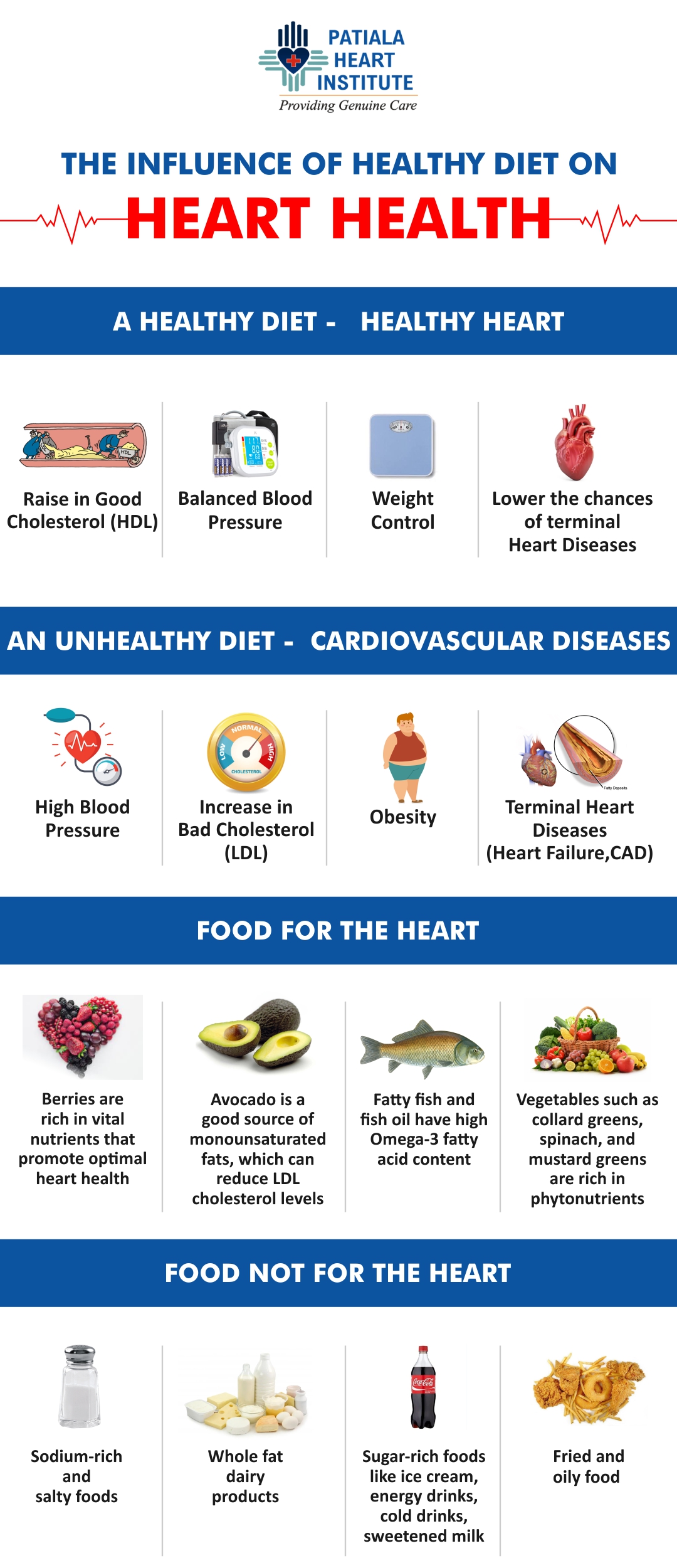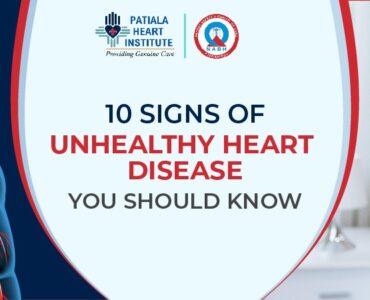If you have heart disease, your primary focus would be on how to prevent it from worsening and improve your overall health. The health of your heart largely depends on the food you consume. You may still be following the medication and exercise regime recommended by your doctor still, this may not be sufficient if you do not follow a healthy diet chart. Hence, a heart patient needs to maintain and follow a proper heart-healthy diet.
How to Prepare an Indian Diet Chart for a Heart Patient?
Preparing and following a heart-healthy diet regime is essential for a heart patient. If you are a heart patient, keep the discussed points in my while preparing a diet chart for yourself:
Control the Portion Size
Any diet plan can be irrelevant if you do not follow portion restrictions. Overloading your plate and eating until you feel full will make you consume more calories. Instead, you can use a small plate or bowl to restrict your meal portion.
Limit Unhealthy Fats
Avoid eating food rich in saturated fat to reduce blood cholesterol levels and coronary artery disease risk. With high blood cholesterol levels, fatty deposits can develop in your arteries, increasing the risk of a heart attack. In addition, foods like cheese, butter, coconut oil, palm oil, red meat, and deep-fried foods contain saturated fat.
Stick to Schedule
Your body requires discipline to be healthy. The time you eat is as important as the type of food. Hence, it is essential to maintain regular eating time, especially when following a heart patient diet plan. Make a meal schedule and stick to it.
Include More Fruits and Vegetables
Fruits and vegetables are low in calories and rich in dietary fibre, vitamins, and minerals. Therefore, adding plant-based foods can help reduce the intake of high-calorie foods like cheese, butter, meat, and snacks. However, high-calorie fruits and vegetables like mango, banana, custard apple, sweet potatoes, etc. should be limited.
List of Foods to Add to your Cardiac Diet Plan
It is important to add heart-healthy foods when preparing an Indian diet chart for heart patients. Food such as fruits, vegetables, and foods rich in Omega-3 fatty acids and fibre can help boost your overall heart health. Here is a list of food types heart patients should include in their diet chart:
Green Leafy Vegetables
Vegetables such as collard greens, spinach, and mustard greens are rich in minerals, fibres, antioxidants, vitamins, and phytonutrients while low in caloric value. Green leafy vegetables are a good source of vitamin K, which is good for arteries. Sufficient intake of vitamin K can reduce the risk of cardiovascular damage by inhibiting calcium deposits from arterial walls.
Berries
Berries are rich in vital nutrients that promote optimal heart health. For example, strawberries, raspberries, blueberries, and blackberries are rich in anthocyanins, a type of antioxidant. Anthocyanins can reduce LDL or bad cholesterol levels and boost HDL or good cholesterol levels. Moreover, berries also protect the heart against oxidative stress and inflammation.
Avocado
Avocado is a good source of monounsaturated fats, which can reduce LDL cholesterol levels and promote heart health. Avocado is also rich in potassium, essential for a steady heart rhythm. Too high or too low intake of potassium can lead to irregular heart rhythm, a risk factor for atrial fibrillation. Hence, adding avocados to your cardiac diet can help reduce blood pressure, bad cholesterol, and the risk of atrial fibrillation.
Fish Oil and Fatty Fish
Fatty fish and fish oil have high Omega-3 fatty acid content. Omega-3 fatty acids can reduce inflammation and promote heart health. Your cardiologist may also prescribe Omega-3 fatty acid supplements. Still, you can add fatty fish to your diet to decrease the risk of arrhythmias and plaque growth in the arteries. In addition, you can add foods like walnuts, ground flaxseeds, and chia seeds if you are a vegetarian.
Whole Grains
Whole grains contain nutrients and fibres that help regulate blood pressure. You can increase the intake of whole grains in your diet chart by replacing refined grain products with whole grains such as whole wheat, barley, oats, parboiled rice, brown rice, buckwheat, and high-fibre cereal.
Legumes, Nuts, and Seeds
Add legumes, seeds, and nuts to your daily diet for a healthy heart. They are rich in heart-healthy fibres, fats, proteins, and several micronutrients. Adding them to your diet can help regulate bad cholesterol levels and promote overall heart health.
| Foods | Nutrients | How they benefit the heart |
| Green leafy vegetables | Vitamin K | Inhibits calcium deposits from arteries |
| Berries | Anthocyanins | Reduces bad cholesterol or LDL and increases good cholesterol or LDL, protects the heart against inflammation and oxidative stress |
| Avocados | Monounsaturated fats and potassium | Reduces LDL cholesterol levels and blood pressure, and prevents irregular heart rhythm, a risk factor for atrial fibrillation |
| Fatty fish, walnuts, ground flaxseeds, and chia seeds | Omega-3 fatty acids | Reduces inflammation, decreases plaque growth in arteries and risk of arrhythmias |
| Whole grains | Fibre | Regulates blood pressure |
| Legumes, nuts, and seeds | Fibre, unsaturated fats, proteins | Regulate bad cholesterol levels |
Foods to Avoid for Heart Patients
A heart patient must avoid food that may increase blood pressure, cholesterol levels, diabetes, and obesity. While planning an Indian diet chart for heart patients, you must avoid the following foods:
- Sodium-rich and salty foods
- Fried food
- Sugar-rich foods like ice cream, sweets, energy drinks, cold drinks, sweetened milk, etc.
- Red meat
- Processed food
- Packaged food
- Junk food
- Whole fat dairy products
Cardiovascular diseases account for one in every four deaths in India.
If you are a heart patient, the best way to improve your heart health is to follow a healthy lifestyle and diet plan. Changing your dietary habits may seem challenging initially, but it can change your health when followed strictly.
Create a heart-healthy diet plan by adding more plant-based foods and avoiding processed, saturated, and sugar-rich foods.
Patiala Heart Institute is the best multispeciality hospital in Patiala. We are known to provide elite healthcare services to our patients. With our team of highly experienced cardiologists, we offer premier cardiac care services around the clock.
Book an appointment with the best heart specialist in Patiala today.
Frequently Asked Questions
What are the three foods to avoid?
Heart patients should avoid consuming foods that can aggravate blood pressure, diabetes, obesity, and cholesterol. They should avoid
- Foods with high sugar content
- Sodium-rich foods
- High-fat foods
Which dry fruit is good for the heart?
Walnuts and almonds are good for the heart as they are rich in fiber and Omega-3 fatty acids. In addition, almonds as well are a good source of unsaturated fats that help reduce cholesterol levels and the risk of heart diseases.








